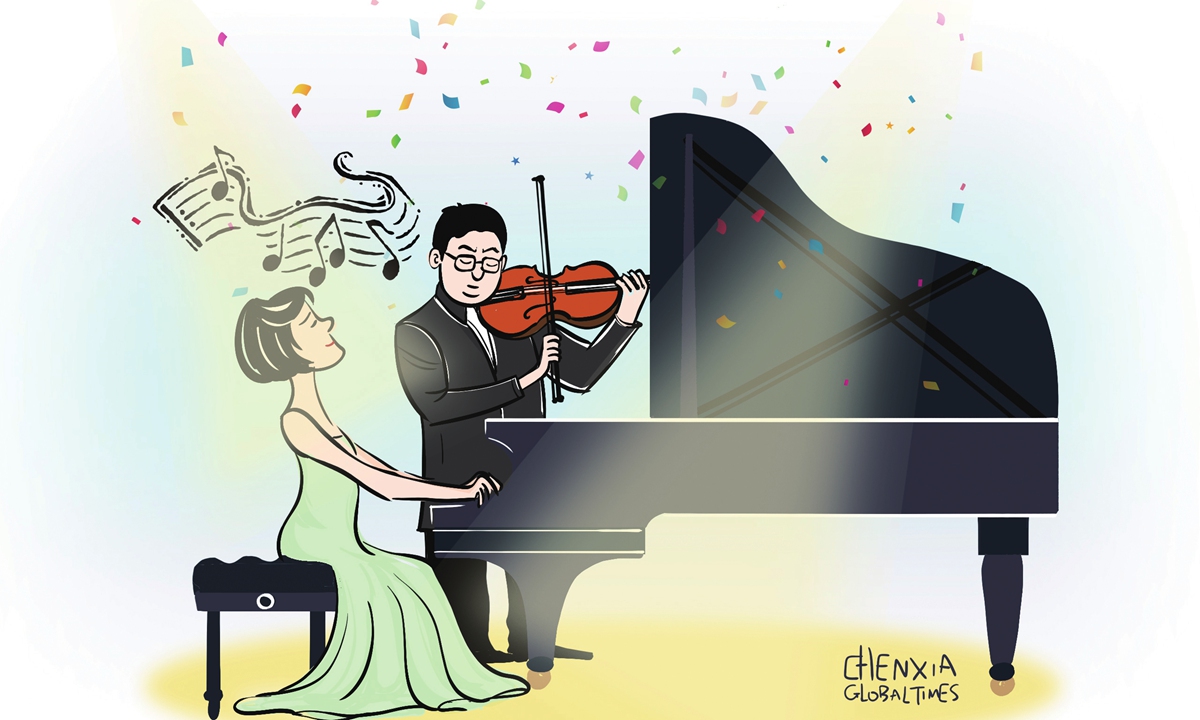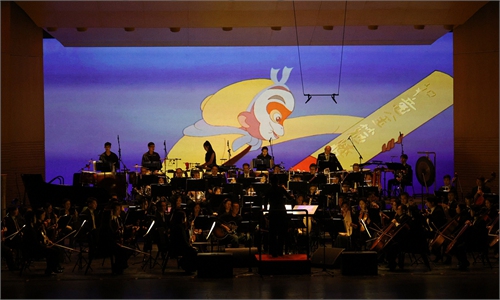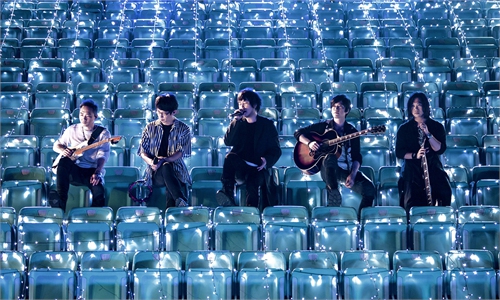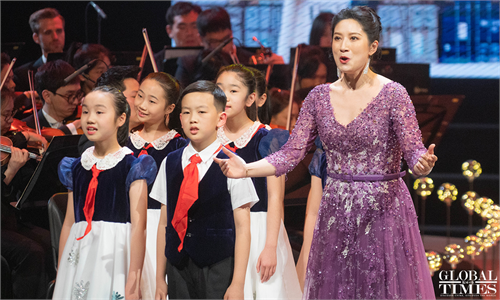ARTS / CULTURE & LEISURE
China's presence rises in global classical music

Illustration:Chen Xia/GT
The global classical music scene has long been dominated by Western names, but recent years have seen a rise in Chinese musicians making their mark. This trend is exemplified by the Berlin Philharmonic's residency in Shanghai, held as part of a special project from the China Shanghai International Arts Festival.
A grand symphonic performance featuring nearly 120 musicians from the Berlin Philharmonic, led by chief conductor Kirill Petrenko, was held at the Shanghai Grand Theatre on Wednesday. This event marked Petrenko's debut in China with the orchestra, setting a high bar for subsequent performances. The concert opened with Modest Mussorgsky's Night on Bald Mountain, which immediately captured the audience.
The highlight of the concert was undoubtedly the orchestra's collaboration with pianist Wang Yuja. Known for her dazzling technique and charismatic stage presence, Wang captivated the audience with her rendition of Sergei Prokofiev's Piano Concerto No.1 in D-flat major, Op.10. Dressed in a striking green gown and high heels, Wang gave a performance that was not only a musical feat but also a visual spectacle.
Her collaboration with the Berlin Philharmonic first began in 2015. Over the past years, she has developed a deep connection with the orchestra, creating performances that are both technically brilliant and emotionally resonant. Wang's connection with the Berlin Philharmonic was further highlighted by her encore performances, which included Pyotr Tchaikovsky's Dance of the Little Swans, Prokofiev's Sonata No.7, and Christoph Willibald Gluck's Melody. These pieces, performed amid thunderous applause, showcased her versatility and deep understanding of the repertoire, leaving the audience in awe.
In the audience sat renowned Chinese-German conductor Tang Muhai and his daughter. In 1983, Tang had been invited by Herbert von Karajan to conduct the Berlin Philharmonic.
"Karajan established a unique, profound, serene, and warm sound for the Berlin Philharmonic," Tang told domestic media.
"Forty years later, while the orchestra has changed, maintaining its prestige, it has become more international, with more female members, enriching its sound."
Following her Prokofiev performance, Tang praised Wang's technique and musical control as "perfect," noting her percussionist-like precision and synergy with the Berlin Philharmonic.
This series of concerts was also significant for another reason: It features the Berlin Philharmonic's first Chinese member, 30-year-old Mei Diyang, who has been principal violist of the philharmonic since October 2022. For Mei, performing in Shanghai with the Berlin Philharmonic was a homecoming of sorts, as he had performed in the city many times before joining the orchestra. Yet it was his first time back as a member of the German orchestra.
Inspired by his grandfather's passion for music, Mei started playing the violin when he was 5. Initially a violinist, he transitioned to the viola at the age of 10. Watching a TV documentary on Karajan and the Berlin Philharmonic sparked his dream of joining the prestigious orchestra. In 2014, Mei furthered his studies in Germany. His talent was recognized at various competitions, notably winning first prize at the ARD International Music Competition in 2018. In 2019, he became the principal violist of the Munich Philharmonic, and in 2022, he achieved his dream by joining the Berlin Philharmonic in the same role.
His journey to become a principal player in one of the world's leading orchestras is a source of inspiration for many young Chinese musicians.
The enthusiasm for classical music in China was palpable. According to the China Shanghai International Arts Festival, tickets for the four symphonic performances, totaling over 6,000, sold out within five minutes of going on sale in April. More than 40 percent of the ticket buyers were from outside Shanghai, with many flying in from other provinces or even overseas to attend the concerts. This phenomenon underscores the powerful draw of classical music in China.
Zhang Xinlang, 18, traveled from Guangzhou, capital of South China's Guangdong Province, to Shanghai just to attend the concerts. For Zhang, who had just finished his college entrance exams, the concerts were a much-anticipated reward.
The Berlin Philharmonic's residency in Shanghai is not just about the concerts. It also includes seven chamber music performances and a series of educational activities, aimed at fostering a deeper appreciation for classical music among Chinese audiences. These activities are part of a broader effort to bridge cultural gaps and promote international cultural exchange through music. The presence of renowned Chinese artists like Wang and Mei in these events highlights the growing influence of Chinese musicians on the global stage.
The orchestra's residency is more than just a series of concerts; it is a celebration of the fusion of Western classical traditions with Chinese talent and enthusiasm. As Chinese musicians continue to rise in prominence on the international stage, events like these play a crucial role in highlighting their contributions and fostering a deeper appreciation for classical music worldwide.
The author is a reporter with the Global Times. life@globaltimes.com.cn



